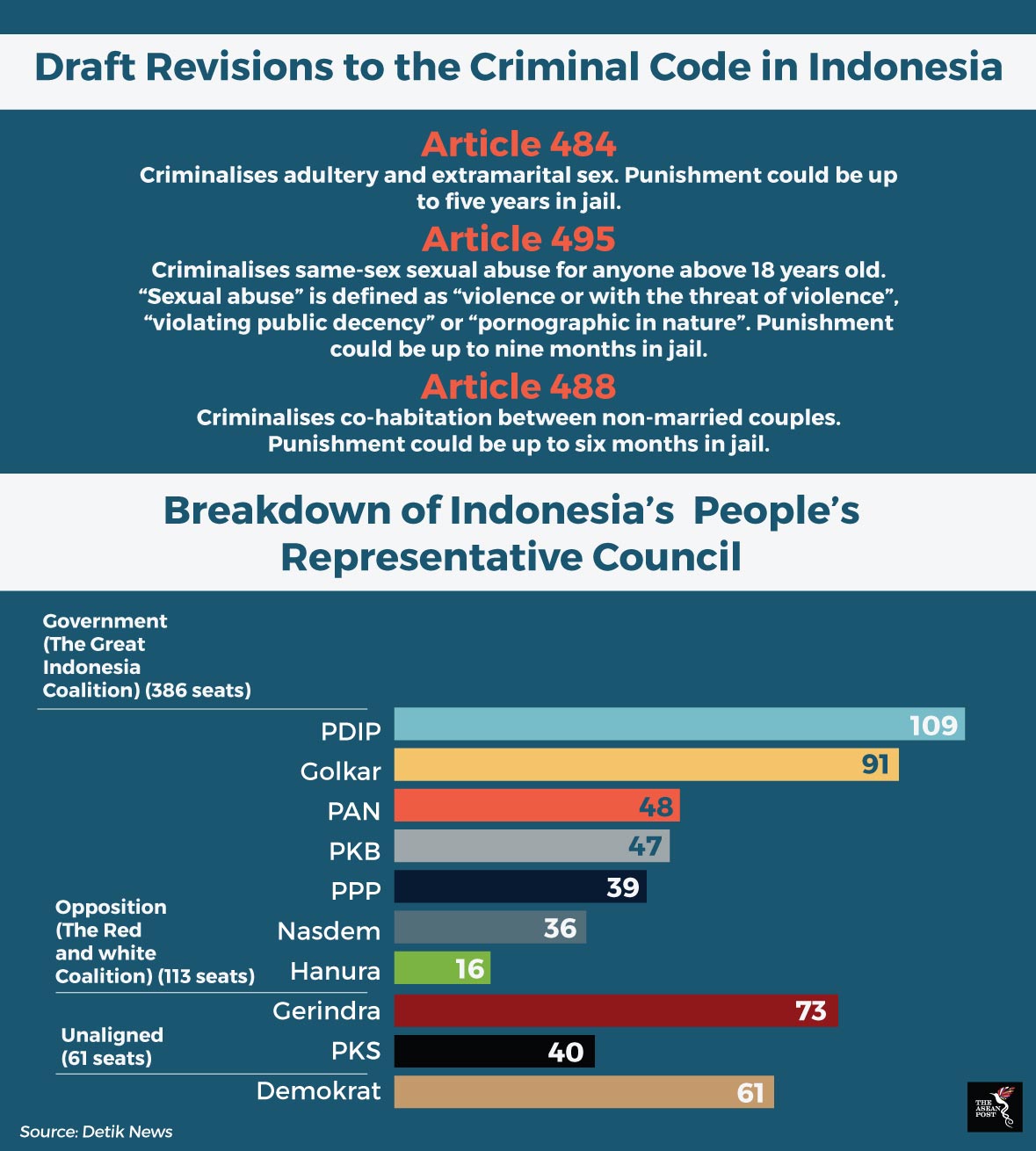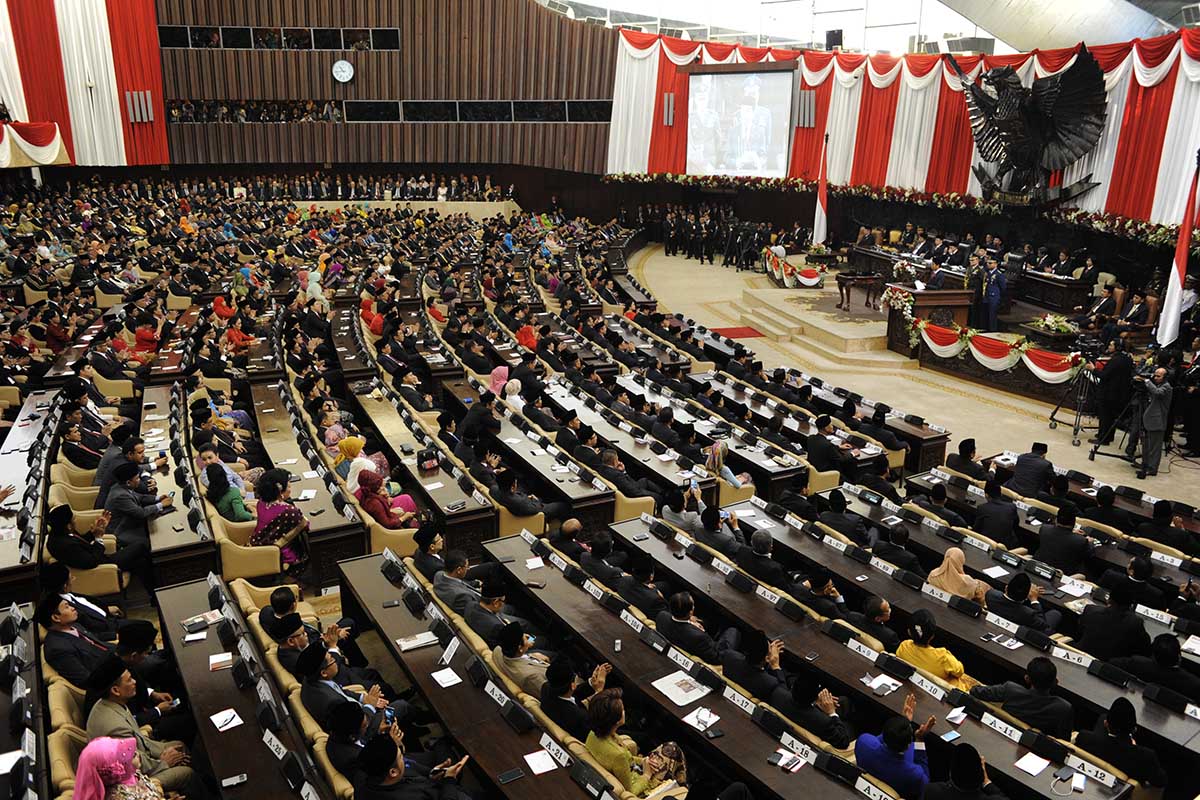Indonesian lawmakers are facing scrutiny from human rights groups and LGBT organisations for their draft of amendments to the national Criminal Code. The amendments, which are currently being finalised in the People’s Representative Council include laws that would punish extramarital sex, cohabitation between couples and same-sex activities.
Indonesia is looking to update its Criminal Code, which they inherited from their Dutch colonisers. The Criminal Code has not been updated since 1958 but there have been many attempts throughout the years to amend it. There have also been similar proposed changes to the Criminal Code previously. For example, in 2013 there were plans to criminalise out-of-wedlock relationships and witchcraft but it didn’t see through parliament. However, Indonesian newspaper Kompas reported this month that the amendments are likely to go through and could be ratified as early as this month.
According to Indonesian newspaper Detik News, under the amended laws, people who commit adultery and have extramarital sex could be punished by up to five years in jail. The laws would also punish co-habitation between non-married couples with up to six months in jail. Human rights activists have spoken out against this, claiming that women and people from the Lesbian, Gay, Bisexual and Transsexual (LGBT) community would be the worst hit communities as a result of such amendments.

The United Nations Human Rights chief, Zeid Ra’ad al-Hussein raised concerns about the proposed laws and is worried about the growing “intolerance” in Indonesia. Speaking at a press conference during his visit to Indonesia this week, he highlighted that the proposed amendments are largely discriminatory and called out those who are taking advantage of this situation for political purposes.
The ASEAN Parliamentarians for Human Rights have also criticised the proposed amendments. In a statement released on 7 February, APHR board member Teddy Baguilat said that “…the amendments are a blatant violation of all Indonesian rights to privacy and their fundamental liberties.”
So far there hasn’t been much criticism of the bill in the Indonesian parliament, with all parties having claimed support for the amendments in public. However, Kate Walton, a feminist activist based in Indonesia, pointed out that minutes from meetings at Reformasi KUHP shows that there are some parliamentarians who have shown some reservations about the amendments.
Kate told The ASEAN Post that they are showing support for the amendments because they believe that this will assist them to gain more votes in the upcoming elections.
The fact that parliamentarians are worried of speaking out against conservative laws in Indonesia could be indicative of the growing influence hardline Islamist groups have had on the region. This follows from the jailing of Basuki Tjahaja Purnama or Ahok. Ahok, the former governor of Jakarta was charged for blasphemy and was sentenced to two years in jail. Prior to being charged by the courts, tens of thousands of Muslims carried out a demonstration demanding the jailing of Ahok. According to Al Jazeera, police officials estimated that 150,000 people flooded the capital. Observers see this particular moment in Indonesian history as emblematic of the influence of hardline Islamic groups in the city.
Indonesia will be heading to the polls twice in the next two years with local elections in July and presidential elections in 2019.
Writing in the University of Nottingham Institute for Asia and Pacific Studies website in August last year, Alexander R Arifianto argued that the growing power of Islamic groups in Indonesia could play an influential role in the upcoming presidential elections.
“Their support might decide whether President Joko Widodo wins re-election or whether he will be replaced by either Prabowo Subianto or Anies Baswedan.” This probably explains why President Joko Widodo or Jokowi is silent over the proposed criminal code laws.
Consequences are starting to show from the growing influence of hardline Islamist groups in Indonesia. Setara Institute has shown that incidents of religious intolerance have increased by 50% from 2014 to 2016. Meanwhile, Alexander R Arifianto revealed that data has shown that more Indonesian provinces have started to implement sharia laws.
As President Jokowi needs to appease both, his liberal party base and the conservative segment of the population, Jokowi needs to rethink his acquiescence to the rise of hardline Islamic groups. The more he tries to pander to that demographic, the more it could legitimise their actions and their advocacy for harsher Islamic laws in the country.
Recommended stories:
